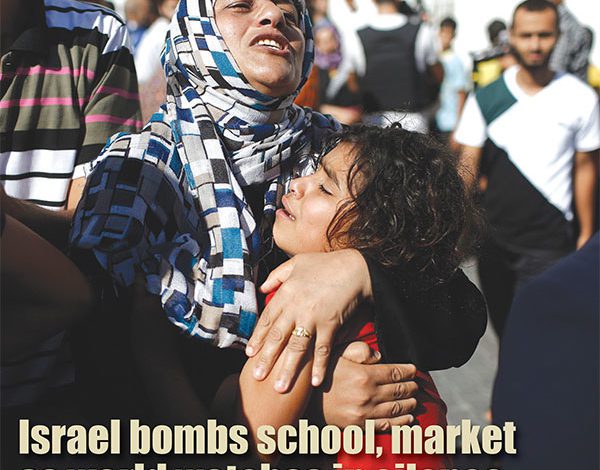
|
| A boy stands in the ruins of a UN school in Jabaliya, northern Gaza Strip. |
GAZA — Israel and Hamas have agreed to a 72-hour ceasefire in their conflict in the Gaza Strip starting on Friday, U.S. Secretary of State John Kerry and UN Secretary-General Ban Ki-moon said on Thursday.
“The ceasefire will begin at 8:00 am local time on Friday, August 1,” they said in a joint statement. The statement said “forces on the ground will remain in place” during the truce, implying that Israeli ground forces will not withdraw.
Israeli shelling killed at least 20 Palestinians sheltering in a U.N.-run school and another 17 near a street market on Wednesday, Gaza’s Health Ministry said, with no ceasefire in sight after more than three weeks of fighting.
Israel’s security cabinet decided to continue its offensive in the enclave and there was no sign of a halt to a 23-day conflict in which 1,346 Palestinians, mostly civilians, have died. On the Israeli side, 56 soldiers and three civilians have been killed.
Some 3,300 Palestinians, mostly civilians, including many women and children, were taking refuge in the school in Jabalya refugee camp when it came under fire around dawn, the United Nations Relief and Works Agency (UNRWA) said.
“Our initial assessment is that it was Israeli artillery that hit our school,” UNRWA chief Pierre Krahenbuhl said in a statement after agency representatives visited the scene and examined fragments, craters and other damage.
Floors and mattresses inside classrooms at the Jabalya Girls Elementary School. Survivors picked through shattered glass and debris for body parts to bury.
“I call on the international community to take deliberate international political action to put an immediate end to the continuing carnage,” Krahenbuhl said.
The Gaza Health Ministry put the number of dead in the school attack at 20, with more than 100 wounded. The United Nations said 16 people were killed.
An Israeli military spokeswoman said militants had fired mortar bombs from the vicinity of the school and troops shot back in response.
The army said three Israeli soldiers were killed on Wednesday when a booby-trap bomb exploded in a tunnel shaft they had uncovered in a residence in the southern Gaza Strip.
Krahenbuhl said the Jabalya school’s precise location and the fact that it was sheltering thousands of displaced people had been communicated to the Israeli military 17 times, with the last notification just hours before the fatal shelling.
Ban, speaking in Costa Rica, condemned the killing. “It is outrageous. It is unjustifiable. And it demands accountability and justice,” he said.
The White House issued an ambiguous condemnation of the school shelling on Wednesday. But CNN reported later that day that the Pentagon will be resupplying Israel with ammunition for the ongoing war.
In a separate incident, Israeli shelling killed at least 17 people and wounded about 160 others near a fruit and vegetable market in Shejaia, a heavily bombarded neighborhood on the eastern outskirts of the city of Gaza, the Health Ministry said.
Witnesses said the crowd had gathered to watch a gas station, hit earlier, burn in the distance. The Israeli military had no immediate comment. “Such a massacre requires an earthquake-like response,” Hamas spokesman Fawzi Barhoum said.
Gaza Health Ministry said rescue workers had recovered 20 more bodies in different areas of Gaza on Wednesday. It was unclear whether the people found were all killed on that day.
The army said 125 rockets were fired from Gaza, some reaching deep into Israel, causing no casualties or damage. Hamas said it fired four rockets toward Tel Aviv.
Israeli Prime Minister Benjamin Netanyahu, facing international alarm over a rising civilian death toll in Gaza, said on Thursday he would not accept any ceasefire that stopped Israel completing the destruction of militants’ infiltration tunnels.
The head of the Israeli military’s southern command, Major General Sami Turgeman, told reporters the army was “but a few days away from destroying all the attack tunnels.”
He added that the offensive against militants in the Hamas Islamist-dominated enclave had been broadened to include more targets in the central and southern Gaza Strip.
According to the Gaza Health Ministry, 1,346 Palestinians, mostly civilians, have been killed since Israel began its offensive on July 8 with the declared aim of halting cross-border rocket fire and tackling Hamas’s tunnel network.
At least 99 Palestinians were killed on Wednesday alone.
Despite the Israeli toll, public support remains strong for continuing the military operation in the hope of preventing future flare-ups.
Mohammed Deif, the shadowy leader of Hamas’s armed wing, said in a broadcast message on Tuesday that Palestinians would continue confronting Israel until its blockade on Gaza – which is supported by neighboring Egypt – was lifted.
Israel has balked at freeing up Gaza’s borders under any de-escalation deal unless Hamas’ disarmament is also guaranteed.
“We are not looking for a ceasefire, though of course military maneuvers are supposed to be followed by diplomatic maneuvers,” Erdan said. “But a ceasefire must fulfil Israel’s terms, a long-term calm and the demilitarization of Gaza.”
The United Nations said Israeli bombing over the past three weeks has destroyed or severely damaged 4,000 Palestinian homes, scores of schools and almost two dozen health facilities.
Some 240,000 people in the Gaza Strip had sought refuge in U.N. schools or with relatives or friends, the U.N. said.
Both President Obama and the U.N. Security Council have called for an immediate ceasefire to allow relief to reach Gaza’s 1.8 million Palestinians, followed by negotiations on a more durable end to hostilities.






Leave a Reply